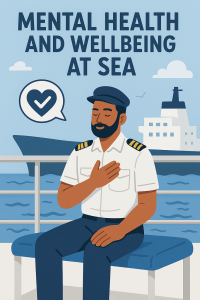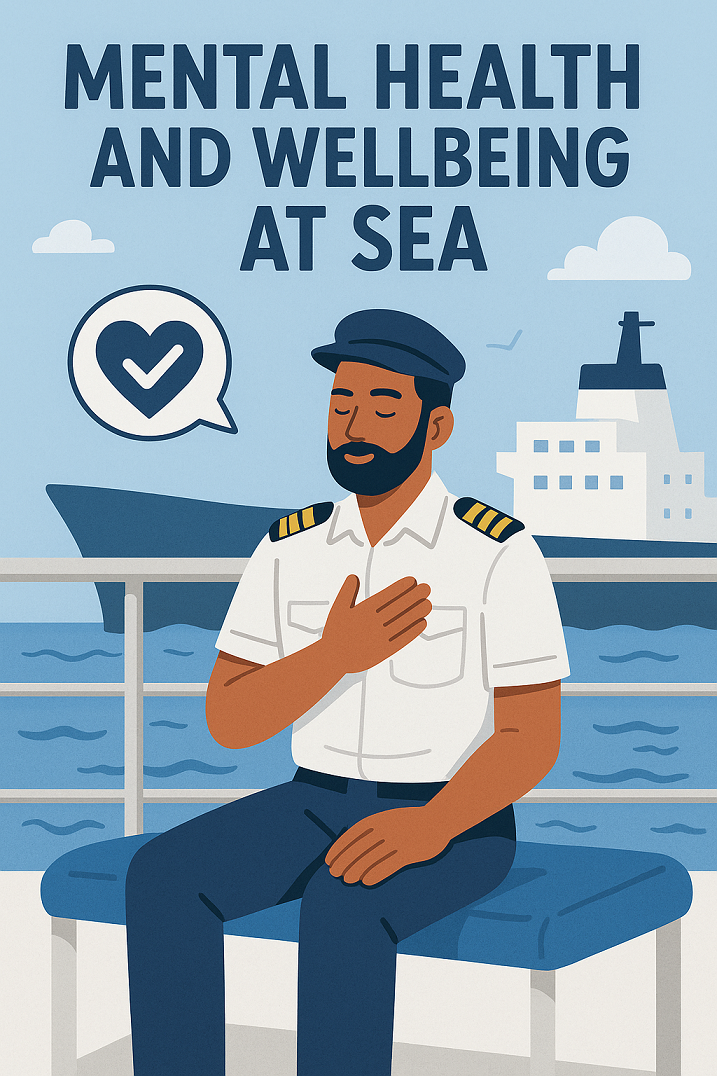A Rising Tide of Awareness
Did you know that up to one in four seafarers report feeling depressed or anxious while working at sea? Despite being vital to global trade—transporting over 80% of goods worldwide—the mental health of maritime professionals has long remained in the shadows. With prolonged isolation, tight work schedules, and high-pressure environments, life at sea can take a toll on even the most seasoned seafarers. But change is on the horizon.
From the Sailors’ Society Cadet Conference 2024 to company-led wellness programs, the maritime industry is awakening to the importance of psychological wellbeing. This article dives deep into the mental health challenges seafarers face, emerging solutions, and the way forward for a safer, healthier maritime world.
Understanding Mental Health Challenges at Sea
The Unique Psychological Landscape of Seafaring
Seafaring isn’t just physically demanding—it’s mentally taxing too. The very nature of life onboard ships exposes seafarers to several stressors:
1. Isolation and Loneliness
Spending months away from home, often with limited internet access, disconnects seafarers from social support systems. Over time, this can contribute to:
- Depression
- Emotional fatigue
- Anxiety
2. Workload and Fatigue
Long working hours, night shifts, and emergency duties—especially during critical operations like berthing or bad weather—cause:
- Sleep disruption
- Burnout
- Reduced mental clarity
3. Cultural and Language Barriers
Multinational crews are the norm, but miscommunications due to language and cultural gaps may lead to:
- Misunderstandings
- Isolation within teams
- Social fragmentation onboard
4. Job Insecurity and Contractual Uncertainty
With many seafarers working on short-term contracts, the uncertainty of future employment can increase:
- Financial stress
- Career-related anxiety
5. Limited Medical Access
Access to mental health professionals at sea is rare. In emergencies, delayed responses intensify the emotional burden.

Industry-Led Initiatives Supporting Seafarers’ Mental Health
As awareness of mental health grows within the maritime sector, industry stakeholders—from NGOs to shipping giants—are taking coordinated action. These initiatives emphasize mental resilience, emotional support, and onboard wellness, recognizing that crew wellbeing is not only a personal concern but a critical factor in safety, retention, and operational performance.
1. Sailors’ Society – Wellness at Sea Program
A flagship initiative in maritime mental health, this program provides a holistic approach to wellness through both in-person and digital training. It equips seafarers with tools to manage the unique challenges of life at sea by covering:
- Emotional resilience and coping mechanisms
- Nutrition and physical wellbeing
- Sleep hygiene and rest routines
- Stress and fatigue management
The program has been implemented across fleets and academies worldwide, setting a strong foundation for a mentally resilient workforce.
2. Sailors’ Society Cadet Conference 2024
In 2024, the Sailors’ Society organized one of the largest cadet-focused mental health events to date. With over 4,000 cadets from South Asia, the conference featured:
- Interactive workshops
- Mental wellness campaigns
- Peer mentorship activities
It aimed to instill early awareness about mental health, empowering the next generation of seafarers to prioritize and advocate for emotional wellbeing.
3. Maritime Charities and Global Helplines
Non-profit organizations have become lifelines for seafarers in crisis, offering free, confidential, and accessible support services:
- ISWAN’s SeafarerHelp: A 24/7 multilingual helpline offering emotional support, legal advice, and guidance in emergencies.
- Mission to Seafarers: Provides port-based chaplaincy services, counseling, and welfare support across global ports.
These services ensure that help is never out of reach, no matter where a ship is sailing.
4. Corporate Wellness Programs: Maersk & NYK Lead the Way
Forward-thinking companies are integrating mental health into their core crew welfare strategies:
-
Maersk’s “WeCare” Initiative
-
Offers access to onboard mental health counseling
-
Includes mindfulness and yoga sessions
-
Provides digital mental health resources and therapist consultations
-
-
NYK Line’s “Care at Sea” Campaign
-
Features structured meditation and resilience training
-
Encourages family engagement to maintain personal connections
-
Tracks wellbeing through anonymous onboard surveys
-
These programs go beyond token efforts, embedding mental wellness into company culture and daily onboard life.
Effective Mental Health Strategies for Seafarers
Key strategies include work-life balance policies (rotational schedules, rest periods), onboard recreation (social events, fitness), mental health training (MHFA, leadership awareness), and improved connectivity (Wi-Fi, telemedicine). These practical steps help reduce stress and boost morale at sea.
From Awareness to Action: Practical Approaches
1. Promoting Work-Life Balance
- Rotational Schedules: Reduce time onboard, improve home life
- Mandatory Rest Periods: Help manage fatigue and performance
2. Recreational Activities Onboard
- Social Events: Movie nights, cultural celebrations
- Fitness Routines: Onboard gym access, fitness apps
3. Mental Health Training
- Leadership Awareness: Officers trained in empathy and stress recognition
- MHFA (Mental Health First Aid): Empowers crew to help one another
4. Enhanced Connectivity
- Wi-Fi & Satellite Links: Keep families close
- Telemedical Support: Access to counselors and doctors at sea
Real-Life Case Studies
Sailors’ Society’s Wellness Champions reduced stress complaints and improved crew morale, while NYK Line’s Care at Sea saw a 35% increase in job satisfaction. These successes highlight the impact of structured mental health programs in maritime workplaces.
Case Study 1: Wellness Champions by Sailors’ Society
Seafarers trained as onboard wellness advocates led to:
- A notable reduction in stress-related complaints
- Improved crew morale and cooperation
Case Study 2: NYK Line’s “Care at Sea” Campaign
Survey results showed:
- 35% increase in job satisfaction
- Better retention rates among crew
Future Outlook: What’s Next for Maritime Mental Health?
Emerging trends include AI-powered wellness tools, stronger MLC regulations, and cross-industry partnerships. These innovations aim to make mental health support standard, ensuring safer and healthier workplaces for seafarers worldwide.
Innovations and Policy Trends to Watch
1. Digital Wellness Platforms
The maritime industry is embracing digital wellness platforms to support seafarers’ mental health. Emerging tools include AI-powered chatbots that provide real-time emotional check-ins and guided mindfulness apps specifically designed for life at sea. These innovations offer immediate, accessible support, helping crew members manage stress, isolation, and anxiety while onboard. By integrating technology into mental health care, shipping companies can ensure continuous wellbeing monitoring and proactive intervention.
2. Regulatory Evolution
Updates to the Maritime Labour Convention (MLC 2006) are expected to strengthen mental health protections for seafarers. Potential changes include mandatory mental health support services onboard all vessels and regular mental health screenings to detect early signs of distress. These regulatory advancements aim to standardize mental health care across the industry, ensuring that shipping companies prioritize psychological wellbeing alongside physical safety. Such reforms could mark a turning point in creating healthier, more sustainable workplaces at sea.
3. Stronger Collaborations
The future of maritime mental health relies on stronger collaborations between shipping companies, healthcare providers, and training academies. By working together, these stakeholders can develop unified mental health protocols, share best practices, and implement standardized training programs. Partnerships will also drive innovation in onboard support systems, making mental health resources more accessible. As cooperation grows, mental health care will transition from an optional benefit to an industry-wide standard, ensuring seafarers receive consistent, high-quality support.
Frequently Asked Questions (FAQs)
Q1: Why is mental health such a challenge for seafarers?
Because of extended isolation, high-pressure environments, and limited access to emotional support or mental health professionals.
Q2: Are there laws mandating mental health support for seafarers?
Currently, support varies by employer, but updates to the MLC 2006 may introduce mandatory provisions.
Q3: How can seafarers access mental health help while at sea?
Via helplines like ISWAN’s SeafarerHelp, telehealth platforms, or through onboard wellness officers.
Q4: What can shipping companies do to help?
Provide rest time, internet access, recreational activities, training, and mental health resources onboard.
Q5: What role do cadet programs play in promoting mental wellness?
They build awareness early, foster peer support, and encourage resilience among future maritime leaders.
Conclusion: Charting a Healthier Course
Mental wellbeing is no longer a side issue—it’s a core concern for maritime safety, retention, and sustainability. Through proactive training, connectivity, onboard culture change, and industry-wide initiatives, we can create a more supportive and resilient seafaring workforce.
✅ Next Step:
Whether you’re a cadet, captain, policymaker, or maritime trainer, start by exploring resources from Sailors’ Society, ISWAN, and your own shipping company. Mental health at sea matters—and your awareness can make waves.
References / Further Reading
Ensuring Seafarers’ Rest: Navigating STCW and MLC Regulations for Maritime Safety

